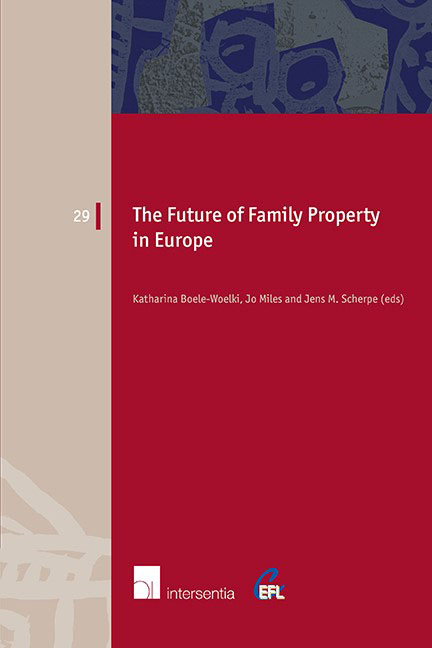Book contents
- Frontmatter
- Preface
- Contents
- List of authors
- PART ONE KEYNOTE LECTURE
- PART TWO MATRIMONIAL PROPERTY LAW IN EU ROPE
- PART THREE FAMILY CONTRACTS – ISSUES OF AUTONOMY
- PART FOUR PROTECTION OF OLDER PEOPLE IN LAW
- PART FIVE FREEDOM OF TESTATION AND PROTECTION OF FAMILY MEMBERS
- PART SIX CHILD MAINTENANCE
- PART SEVEN UNIFICATION OF PRIVATE INTERNATIONAL FAMILY LAW
- PART EIGHT CLOSING REMARKS
Cohabitant Obligations: Contract Versus Status
Published online by Cambridge University Press: 08 May 2020
- Frontmatter
- Preface
- Contents
- List of authors
- PART ONE KEYNOTE LECTURE
- PART TWO MATRIMONIAL PROPERTY LAW IN EU ROPE
- PART THREE FAMILY CONTRACTS – ISSUES OF AUTONOMY
- PART FOUR PROTECTION OF OLDER PEOPLE IN LAW
- PART FIVE FREEDOM OF TESTATION AND PROTECTION OF FAMILY MEMBERS
- PART SIX CHILD MAINTENANCE
- PART SEVEN UNIFICATION OF PRIVATE INTERNATIONAL FAMILY LAW
- PART EIGHT CLOSING REMARKS
Summary
Family property law governs the property rights and obligations that flow from family relationships. It defines the relationships that may produce property interests; it determines when, and how, such interests arise.
This chapter considers how family property law should treat non-marital cohabitation, a relational status that has increased dramatically over the past half century. Indeed, within a single decade, the number of unmarried-cohabitant households in the UK increased by 67%, and the number with minor children doubled. Similar developments have occurred in most developed nations, and there is no sign that the trend in favor of premarital cohabitation has yet abated.
Are the relationships of non-marital cohabitants familial? If yes, should cohabitation give rise to status-based property entitlements some or all of the time? This chapter addresses these important questions.
COHABITATION AND FAMILY PROPERTY LAW : TRADITION AND CHANGE
Traditional family property law did not view cohabitants as family members, and no rights or obligations flowed from such a relationship. Some legal regimes did recognize customary or “common-law” marriage, but the rights and obligations attached to common-law marriage were identical to those attached to formal, ceremonial marriage. This does not mean that jurisdictions which recognized common-law marriage saw cohabitation as the equivalent of marriage. Quite to the contrary, the cohabitant who wished to claim common-law marital status was required to prove not only cohabitation, but also an agreement to be married and a reputation, or “holding-out,” as a married couple. “Far from equating cohabitation and marriage”, the common-law marriage doctrine and other related customarymarriage laws “in fact depended on there being a sharp distinction between the two.” Participants in a common-law marriage were seen as a married couple, not as non-marital cohabitants. Cohabitation per se created no status-based rights or obligations; indeed, cohabitants could not contract to create such rights or obligations based on their private relationship.
Cohabitants could typically enter into business contracts, or even service contracts if the services specified were typically compensated. In some legal systems, courts of equity also provided relief to cohabitants who had relied on the promises of a non-marital partner to his or her detriment. The purchase money resulting trust sometimes protected the cohabitant who had paid money toward the purchase of property when title was taken in the name of his or her partner.
- Type
- Chapter
- Information
- The Future of Family Property in Europe , pp. 115 - 138Publisher: IntersentiaPrint publication year: 2011

